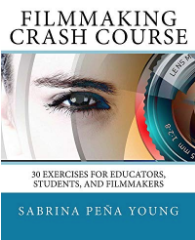Starting Your First Short Film
“Nothing is
original. Steal from anywhere that resonates with inspiration or fuels your
imagination. Devour old films, new films, music, books, paintings, photographs,
poems, dreams, random conversations, architecture, bridges, street signs,
trees, clouds…Select only things to steal from that speak directly to your
soul…always remember what Jean-Luc Godard said.
‘It’s not where you take things from – it’s where you take them to.’– Jim Jarmusch
‘It’s not where you take things from – it’s where you take them to.’– Jim Jarmusch
Filmmakers, much like novelists or composers, bear their souls within their films, especially in the earliest stages of filmmaking, before the lights of Hollywood dazzle them with wealth and fame. Yet, to be successful in film/media/video production, there is a combination of inspiration and sheer grit.
You have to know how to create something incredible within a deadline, with a tight budget, with that actress that can’t seem to remember her lines but can’t be fired because she contracted to the job.
Once you write your screenplay you need to see if your story falls into very typical plot lines. Why does this matter? Every genre has had its heyday. Spaghetti Westerns, Horror Films, Musicals, and Superhero Films have all had a time and place in our history. Many times their storylines were based on a combination of literature, history, mythology, and the writer’s own life.
From this we have had a plethora of incredible stories and tales, enough to truly fill centuries of entertainment. But this also means that lazy filmmakers have fallen on some tropes that are dated, boring, and sometimes just wrong in today’s post-postmodern society. In a world where we can quickly find out almost any fact in an instant, authenticity has become important.
The notable exception is the comedy, and sometimes children’s films, where tropes and stereotypes are explored and sometimes welcome. This can be for the sake of comedy or just simplicity. Take the Beverly Hills Chihuahua franchise, for example. Dated? Yes. But still pretty hilarious to a second-grader.
Always have readers go through your screenplay a few times. You need to revise and revise and revise before handing the screenplay off to the cast and crew. Why? Actors get EXCITED about films that have them playing meaningful multidimensional characters in intricate original plots.
The happier the actors are, the better the performance. The better the performance, the better the film.
For more great filmmaking advice and screenwriting exercises, download the Filmmaking Crash Course by Sabrina Young.
You have to know how to create something incredible within a deadline, with a tight budget, with that actress that can’t seem to remember her lines but can’t be fired because she contracted to the job.
 |
| Download the Filmmaking Crash Course by Sabrina Young today from AmazonDOWNLOAD |
Once you write your screenplay you need to see if your story falls into very typical plot lines. Why does this matter? Every genre has had its heyday. Spaghetti Westerns, Horror Films, Musicals, and Superhero Films have all had a time and place in our history. Many times their storylines were based on a combination of literature, history, mythology, and the writer’s own life.
From this we have had a plethora of incredible stories and tales, enough to truly fill centuries of entertainment. But this also means that lazy filmmakers have fallen on some tropes that are dated, boring, and sometimes just wrong in today’s post-postmodern society. In a world where we can quickly find out almost any fact in an instant, authenticity has become important.
The notable exception is the comedy, and sometimes children’s films, where tropes and stereotypes are explored and sometimes welcome. This can be for the sake of comedy or just simplicity. Take the Beverly Hills Chihuahua franchise, for example. Dated? Yes. But still pretty hilarious to a second-grader.
REVISE AND REVISE AGAIN
Always have readers go through your screenplay a few times. You need to revise and revise and revise before handing the screenplay off to the cast and crew. Why? Actors get EXCITED about films that have them playing meaningful multidimensional characters in intricate original plots.
The happier the actors are, the better the performance. The better the performance, the better the film.
For more great filmmaking advice and screenwriting exercises, download the Filmmaking Crash Course by Sabrina Young.

Comments